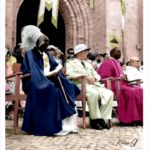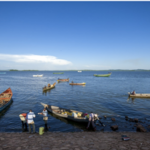The Court, the Germans, and the Missionaries
Faced with further trouble with the Fathers in the next months, Musinga again made use of Kandt and von Grawert. When the Fathers wanted to cut timber in the forest of Budaha, north of Nyantango, Musinga replied that this was impossible because he had already designated these trees for Kandt’s use.After reports of the Fathers’ clients insulting, threatening, and even beating notables in their efforts to get trees transported reached Court, Musinga informed Kandt, who reprimanded the missionaries. When the Fathers again felled some of the sacred trees, Musinga protested to von Grawert, who delivered a stern warning to the missionaries to respect such trees.The Fathers at Zaza sent several cases involving Christians to Court and urged Musinga to decide for the converts. The mwami handed the troublesome cases to Kandt who found the evidence insufficient and dismissed the whole affair. During 1906 the Germans also decided to prohibit any foundations of new missions in the near future. Whether or not this decision was made at Musinga’s specific request, his complaints about the Fathers must certainly have helped persuade the Germans to take this course.
Yet Musinga still turned to the Fathers for particulars. For example, as a symbol of his support for the mwami, Kandt had given him a gun. But when he neglected to provide sufficient ammunition, Musinga did not hesitate to request bullets from the Fathers.In a like manner, the mwami wanted to use Kandt against the Fathers, but never at the cost of completely severing relations with them; after all, the Fathers could still help him against Kabare and might at some time be useful against the Germans themselves. When the Fathers took Kandt’s admonition seriously and tried for better relations with Musinga, the mwami readily responded with compliments and gifts of cattle. When one of Kabare’s clients accused the missionaries of again felling sacred trees, Musinga saw the accusation as a tactic to isolate him from the Fathers. He quickly accepted the explanation the Fathers gave of the affair, urging them not to take offense at the accusation and not to return the cow he had given them shortly before: to do so would demonstrate a clear break with the mwami and so would weaken him in his struggle against Kabare.
During August and September 1906 Musinga continued his studies with a client of the Fathers, but of the fifty other Tutsi who had begun to learn with him, only three remained, probably indicating that Musinga was becoming more isolated by the anti-European group at Court. During his interviews with his teacher and with Rutwaza, whohad been restored to favor and who now served as messenger between Musinga and the Fathers, the mwami constantly inquired about the missionaries’ beliefs, attitudes, and plans. His approach toward their dogma softened sufficiently for him to declare, “I do not hate your God; but I could never do what the Christians do.” When dealing with the Europeans or their representatives, Musinga began receiving them alone for the first time, sending away even Kabare and Rwidegembya.
In October Musinga obliged the Fathers by ordering that more trees be transported to Kabgayi. The notables subordinate to some of the most important men at Court, including Kabare and Rwidegembya, delayed or refused to execute Musinga’s commands. When the mwami learned this, he was furious. Cooperation with the Fathers had become a test of strength between the young man who wanted to rule and his maternal relatives who wanted him only to reign. Musinga summoned all the disobedient notables and made them swear one by one on his spear that they would execute his orders. Impressed by this act, the notables then complied with his commands. Rutwaza, who had brought the report of their disobedience to Nyanza, wanted to return immediately to Kabgayi. But Musinga, anxious to demonstrate his control over a man of the missionaries and eager for the added support of his presence, insisted that he remain several days at Court. To counter the charges of Kabare’s party that the men of the missionaries were lest to royal authority, Musinga sought opportunities to show his control over them. He notified the Fathers, for example, that he wished converts to greet him with applause, as did all other Rwandans, a custom they had apparently been neglecting. On another occasion Musinga asked Rutwaza to read a passage to him. The convert at first declined, saying he was barely literate. But when Musinga insist
Faced with further trouble with the Fathers in the next months, Musinga again made use of Kandt and von Grawert. When the Fathers wanted to cut timber in the forest of Budaha, north of Nyantango, Musinga replied that this was impossible because he had already designated these trees for Kandt’s use.After reports of the Fathers’ clients insulting, threatening, and even beating notables in their efforts to get trees transported reached Court, Musinga informed Kandt, who reprimanded the missionaries. When the Fathers again felled some of the sacred trees, Musinga protested to von Grawert, who delivered a stern warning to the missionaries to respect such trees.The Fathers at Zaza sent several cases involving Christians to Court and urged Musinga to decide for the converts. The mwami handed the troublesome cases to Kandt who found the evidence insufficient and dismissed the whole affair. During 1906 the Germans also decided to prohibit any foundations of new missions in the near future. Whether or not this decision was made at Musinga’s specific request, his complaints about the Fathers must certainly have helped persuade the Germans to take this course.
Yet Musinga still turned to the Fathers for particulars. For example, as a symbol of his support for the mwami, Kandt had given him a gun. But when he neglected to provide sufficient ammunition, Musinga did not hesitate to request bullets from the Fathers.In a like manner, the mwami wanted to use Kandt against the Fathers, but never at the cost of completely severing relations with them; after all, the Fathers could still help him against Kabare and might at some time be useful against the Germans themselves. When the Fathers took Kandt’s admonition seriously and tried for better relations with Musinga, the mwami readily responded with compliments and gifts of cattle. When one of Kabare’s clients accused the missionaries of again felling sacred trees, Musinga saw the accusation as a tactic to isolate him from the Fathers. He quickly accepted the explanation the Fathers gave of the affair, urging them not to take offense at the accusation and not to return the cow he had given them shortly before: to do so would demonstrate a clear break with the mwami and so would weaken him in his struggle against Kabare.
During August and September 1906 Musinga continued his studies with a client of the Fathers, but of the fifty other Tutsi who had begun to learn with him, only three remained, probably indicating that Musinga was becoming more isolated by the anti-European group at Court. During his interviews with his teacher and with Rutwaza, whohad been restored to favor and who now served as messenger between Musinga and the Fathers, the mwami constantly inquired about the missionaries’ beliefs, attitudes, and plans. His approach toward their dogma softened sufficiently for him to declare, “I do not hate your God; but I could never do what the Christians do.” When dealing with the Europeans or their representatives, Musinga began receiving them alone for the first time, sending away even Kabare and Rwidegembya.
In October Musinga obliged the Fathers by ordering that more trees be transported to Kabgayi. The notables subordinate to some of the most important men at Court, including Kabare and Rwidegembya, delayed or refused to execute Musinga’s commands. When the mwami learned this, he was furious. Cooperation with the Fathers had become a test of strength between the young man who wanted to rule and his maternal relatives who wanted him only to reign. Musinga summoned all the disobedient notables and made them swear one by one on his spear that they would execute his orders. Impressed by this act, the notables then complied with his commands. Rutwaza, who had brought the report of their disobedience to Nyanza, wanted to return immediately to Kabgayi. But Musinga, anxious to demonstrate his control over a man of the missionaries and eager for the added support of his presence, insisted that he remain several days at Court. To counter the charges of Kabare’s party that the men of the missionaries were lest to royal authority, Musinga sought opportunities to show his control over them. He notified the Fathers, for example, that he wished converts to greet him with applause, as did all other Rwandans, a custom they had apparently been neglecting. On another occasion Musinga asked Rutwaza to read a passage to him. The convert at first declined, saying he was barely literate. But when Musinga insisted and Rutwaza obliged by stumbling over a few words, the mwami congratulated him on his obedience and rewarded him with a watch, “a Zenith.” Rutwaza had no interest in the watch, which he immediately sold, but he rejoiced to think that the “Zenith” was “the beginning of a cow,” which indeed it was. Within several months this formerly outcast Tutsi had received the cow that made him a mugaragu of the mwami. In December 1906 Musinga once more pleased the missionaries by declaring that he would like to see all his people learn to pray. Soon after, he indicated his trust in converts by allowing one to serve as a royal drummer, a position of great ritual importance.”
Throughout 1907 and into 1908 Musinga continued to draw strength from his relations with the Fathers as he sought to wrest effective control of Rwanda from Kabare and his followers. In January 1907 the fire that symbolized the vitality of the dynasty and which was kept constantly burning went out through the carelessness of its guardians. Alarmed at possible reprisals by the spirits of his ancestors, Musinga killed those responsible. Kabare’s opponents accused him of having arranged the accident. Although Musinga did not dare take up such a serious accusation, which would have allowed him to rid himself completely of his uncle, several months later he felt secure enough to revoke some of the domains commanded by Kabare and his clients. In July 1907 he also deprived Rwidegembya of some prized pastureland and granted it to the Fathers. In September Musinga decided that Kabare and Rwidegembya lived too far from Court to allow for careful observation of their activities. He ordered these two most powerful notables to build their homes at Nyanza itself on a site between the Fathers’ school and the residences of some notables friendly to Musinga and the missionaries.
ed and Rutwaza obliged by stumbling over a few words, the mwami congratulated him on his obedience and rewarded him with a watch, “a Zenith.” Rutwaza had no interest in the watch, which he immediately sold, but he rejoiced to think that the “Zenith” was “the beginning of a cow,” which indeed it was. Within several months this formerly outcast Tutsi had received the cow that made him a mugaragu of the mwami. In December 1906 Musinga once more pleased the missionaries by declaring that he would like to see all his people learn to pray. Soon after, he indicated his trust in converts by allowing one to serve as a royal drummer, a position of great ritual importance.”
Throughout 1907 and into 1908 Musinga continued to draw strength from his relations with the Fathers as he sought to wrest effective control of Rwanda from Kabare and his followers. In January 1907 the fire that symbolized the vitality of the dynasty and which was kept constantly burning went out through the carelessness of its guardians. Alarmed at possible reprisals by the spirits of his ancestors, Musinga killed those responsible. Kabare’s opponents accused him of having arranged the accident. Although Musinga did not dare take up such a serious accusation, which would have allowed him to rid himself completely of his uncle, several months later he felt secure enough to revoke some of the domains commanded by Kabare and his clients. In July 1907 he also deprived Rwidegembya of some prized pastureland and granted it to the Fathers. In September Musinga decided that Kabare and Rwidegembya lived too far from Court to allow for careful observation of their activities. He ordered these two most powerful notables to build their homes at Nyanza itself on a site between the Fathers’ school and the residences of some notables friendly to Musinga and the missionaries.
https://uk.amateka.net/the-court-the-germans-and-the-missionaries/https://uk.amateka.net/wp-content/uploads/2020/07/colon.jpghttps://uk.amateka.net/wp-content/uploads/2020/07/colon-150x150.jpgChanges and ColonialismChurch and RevolutionHistory of kingsFaced with further trouble with the Fathers in the next months, Musinga again made use of Kandt and von Grawert. When the Fathers wanted to cut timber in the forest of Budaha, north of Nyantango, Musinga replied that this was impossible because he had already designated these trees for...BarataBarata rpierre@ikaze.netAdministratorAMATEKA | HISTORY OF RWANDA




